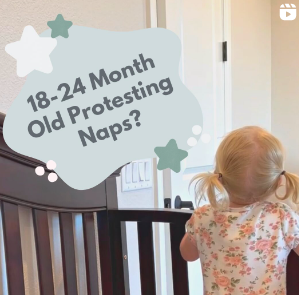I’m just going to start by stating the good news: the 18 month sleep regression is one of the last regressions! The end to sleep regressions is in sight, there is light at the end of the tunnel!!
Just keep that coffee stocked, dream of the better sleep regressionless days, and read on to learn how to get sleep back on track.
In this blog post, I’m going to go over the basics of the 18 month sleep regression, address the common characteristics of the 18 month sleep regression, and what to do about them:
18 month sleep regression signs
How long does the 18 month sleep regression last?
18 month sleep regression and separation anxiety
18 month sleep regression and early waking
18 month sleep regression signs
In general, you know you are entering an age-based sleep regression if sleep is suddenly falling apart and you can rule out:
- Teething
- Illness
- A change in their routine/life (moving, potty training, recent travel, starting daycare, etc)
At 18 months, your little one is just starting to embark on toddlerhood. This can cause sudden bouts of protest around nap or bedtime. Toddlers tend to have a lot of FOMO (fear of missing out) which means sleep can end up at the bottom of their to-do list.

Whether you are experiencing short nap(s), early morning wakings, or not wanting to go down for sleep at their usual time, read on for what you can do to get sleep back on track and not accidentally form any undesirable habits.
How long does the 18 month sleep regression last?
Most sleep regressions last around 2 weeks. The key is to not accidentally form a new habit that you have no intention of keeping, as that can make it seem like the sleep regression is going on longer than it should. If you are concerned that this is happening or has already happened, not to worry, we can totally hop on a call with you to help you come up with a plan to meet your toddler’s emotional needs and still foster independent sleep.
18 month sleep regression and separation anxiety
Around 18 months, you may notice that your toddler is displaying separation anxiety type behavior. This is totally normal!! It’s an exciting but overwhelming time for them as they try and make sense of the world around them.
This separation anxiety often causes toddlers to protest going to sleep. You may find that you used to be able to put them in their crib and say goodnight, and they happily went to sleep, but now they lose their marbles when you start making your way to the door.
If this is happening, first of all, please know that it’s totally normal and happens to a LOT of families.
Some things you can do are:
- Toddlers thrive on consistency: Set them up for success with a clear and consistent bedtime routine.
- Toddlers crave feeling in control: Give them lots of choice throughout the bedtime routine (what pj they wear, what flavor of toothpaste, etc.).
- Toddlers thrive on predictability: Have clear boundaries set in place and a plan for how you will meet their emotional needs. For example, maybe they have to stay in their own bed, but you will sit beside the crib.
The key is creating an individualized plan that is going to work for YOUR family. This is when a consultation is SO valuable! We can help you create a plan for how to get sleep back on track and also meet your little one’s needs.
Is your 18 month protesting naps specifically? Here are a few tips:
18 month sleep regression and early waking
The other super fun thing that can happen during the 18 month sleep regression is that your little one starts having early morning wakings. Sometimes, so early, that the use of the word “morning” is questionable.
Is this is happening, I have two main suggestions:
1. Prevent overtiredness
If your little one goes to bed at night overtired, they are more likely to have night wakings and start the day earlier. So if your toddler doesn’t meet their total daytime sleep needs (for whatever reason), consider bumping bedtime a little earlier. Remember, sleep begets sleep, so an earlier bedtime is likely to result in a later morning waking.

2. Support desirable wake times using an “OK to Wake” clock
An “ok to wake” clock is a great way to reinforce an appropriate wake up time for naps and the start of the day. The idea is that the clock will light up when it’s time to get up. It can take some time for your little one to catch on, however over time they will likely wake up, see that the light is not on yet, and go back to sleep. In the beginning it is common for parents to need to help reinforce this new expectation. That may look like you being in the room with them, using a hushed voice to remind them that “it’s not morning yet, we need to wait until the light turns on” and then changing your tone to “GOOD MORNING!! The light turned on!! Now we can get up!”
Recap on 18 month sleep regression
Yes, the 18 month sleep regression can be ROUGH, but the best thing you can do is set clear and consistent boundaries and foster independent sleep while also meeting their emotional needs.
Be cognizant that you are not forming a new sleep habit that is undesirable to YOU. (There are no “bad” or “good” sleep habits, just habits that do or don’t work for your family).
My toddler guide pack is FULL of information on separation anxiety, stalling bedtime, getting out of bed, power struggles, nightmares/fears and SO much more! You can check it out here.
Also, sometimes more individualized support is ideal. Having a sleep expert who can help you create a plan and be in your corner is SO valuable. We would love to be that person for you! Check out all of our consultation options here – we can’t wait to meet you and your family!




0 Comments